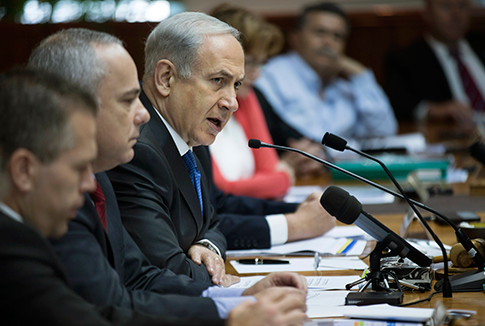By Crispian Balmer
JERUSALEM (Reuters) - Iran's election has exposed popular discontent with the Tehran government but is unlikely to bring about any change in Iranian nuclear policy, Israeli Prime Minister Benjamin Netanyahu told Reuters on Monday.
Acknowledging that economic sanctions were clearly taking their toll on Iran, Netanyahu said the pressure needed to be maintained and urged Western allies not to pin their hopes on the newly elected Iranian president, Hassan Rohani.
"He doesn't count. He doesn't call the shots," Netanyahu said, adding that Iran's supreme leader, Ayatollah Ali Khamenei, made all the decisions regarding nuclear policy, which the West fears is geared towards developing an atomic bomb.
"The Iranian election clearly reflects deep disaffection of the Iranian people with its regime, but unfortunately it doesn't have the power to change Iran's nuclear ambitions," said the Israeli leader, who heads a centre-right coalition government.
Iran denies that it wants nuclear weapons and says its atomic program is focused exclusively on civilian needs.
Rohani was viewed as moderate by comparison with the other presidential candidates. His emphatic election victory on Sunday surprised many Western governments.
Iran's nuclear negotiator from 2003 to 2005, Rohani said on Monday that Tehran would be more transparent about its nuclear activities in future.
However, Netanyahu, who views Iran's nuclear program as an existential threat to Israel, quoted a 2004 speech in which Rohani openly acknowledged developing Iran's nuclear capabilities while all the while holding talks with Europeans.
"They are using time. He himself admitted they were using time basically to continue Iran's nuclear weapons program," said Netanyahu, sitting in his Jerusalem office, a large map of the Middle East and Iran pinned next to the main doorway.
"BUYING TIME"
The situation has changed dramatically in Iran since 2004, with increasingly rigid western sanctions damaging the local economy, forcing a sharp reduction in oil output and a deep fall in the value of Iran's currency.
"These sanctions actually produced the change we have seen today. They did not work counterproductively. They produced some change in Iran, but they have not yet produced the change that we need to see," Netanyahu said.
"So stay firm with the demands and firm with the sanctions."
Israel, widely believed to be the Middle East's only atomic power, has signaled it could take military action against Iran if sanctions and diplomacy fail to bring about a change.
In a speech to the United Nations last September, Netanyahu drew a "red line" for Iran's uranium enrichment - the point at which it could swiftly upgrade its stockpiles to build a bomb. Officials put this at 250 kg of 20 percent enriched uranium.
Since then, the Iranians have converted some of their enriched uranium into a powder, staying below the threshold set by Netanyahu, in a move that some experts say has enabled Tehran effectively to circumvent the Israeli threat.
Netanyahu said he would not be setting any further red lines, but added that world powers had to persuade Iran to halt all enrichment and remove the uranium stockpiles.
"The red line has not changed. Neither has the Iranian pursuit of approaching it gradually, running out the clock, buying time, putting up a more hospitable face. These are all tactics. Again and again and again," he said.
The United States has said it will not let Iran obtain the bomb, but in recent weeks the White House has been more focused on the civil war in Syria, announcing at the weekend that it was prepared to arm rebels fighting President Bashar al-Assad.
Netanyahu has previously cautioned against such a move, worried that the weapons could fall into the wrong hands and be turned against Israel, which shares a tense frontier with Syria.
Asked about the U.S. step, the Israeli leader said: "I can understand the decision of President Obama. What is happening in Syria is a tremendous tragedy."
